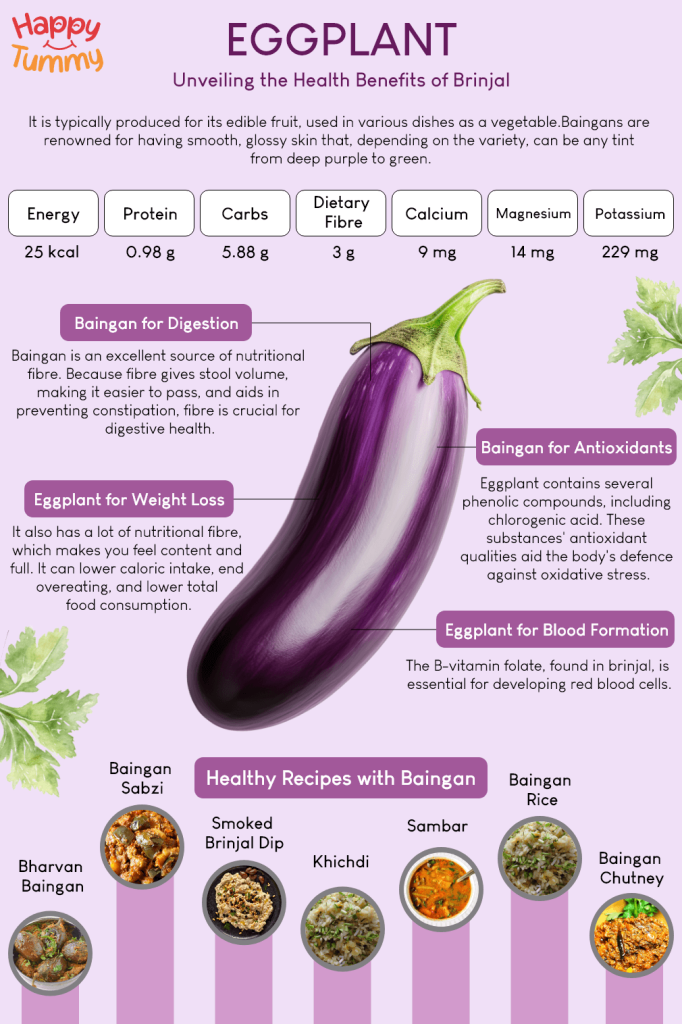From Antioxidants to Fiber: Your Guide to Eggplant’s Health Perks
In the sprawling tapestry of global cuisine, few vegetables possess the mystique, versatility, and often underestimated nutritional power of the eggplant. Known variously as aubergine in Europe, brinjal in South Asia, and simply eggplant in North America, this glossy, purple-hued member of the nightshade family (Solanaceae) has embarked on a remarkable journey from ancient obscurity to a modern superfood. For centuries, it has graced tables from the Mediterranean to the Far East, lending its unique texture and subtly earthy flavor to an astonishing array of dishes. Yet, beyond its culinary charisma lies a deeper narrative—a story of profound health benefits, patiently unveiled by scientific inquiry, that positions the humble eggplant as a formidable ally in the pursuit of wellness.
This is not merely a chronicle of nutrients; it is an exploration of eggplant’s enduring legacy, tracing its historical roots, dissecting its complex nutritional profile, and illuminating the specific mechanisms through which it contributes to our health, from bolstering cardiovascular function and stabilizing blood sugar to safeguarding our brains and potentially even fighting cancer. For the discerning and knowledgeable audience, we delve beyond the surface, uncovering the hidden heroes within this remarkable fruit (yes, botanically, it’s a fruit!), primarily its powerful antioxidants and abundant fiber, which together orchestrate a symphony of protective and restorative actions within the human body.
A Journey Through Time: Eggplant’s Historical and Cultural Tapestry
Our story begins not in a modern laboratory, but in the verdant, tropical climes of ancient India, the recognized center of origin for Solanum melongena. Here, thousands of years ago, wild varieties of eggplant, often smaller and more bitter than their domesticated descendants, were first cultivated. Early Sanskrit texts speak of its presence, highlighting its role not just as a foodstuff but also in traditional medicine, where it was valued for its purported digestive and anti-inflammatory properties.
From India, the eggplant embarked on a slow, deliberate migration, carried by trade routes and cultural exchange. It journeyed eastward to China, where it quickly became a culinary staple, appearing in intricate imperial dishes and common household meals alike. The Chinese, through selective breeding, developed many of the elongated, slender varieties we recognize today.
The westward expansion was equally significant. Around the 7th century, Arab traders and conquerors introduced eggplant to Persia, and from there, it spread throughout the Middle East and North Africa. The Arabs were instrumental in popularizing the plant across their vast empire, developing iconic dishes like baba ghanoush, a smoky eggplant dip, and moussaka, a layered casserole that would later become synonymous with Greek cuisine. It was through the Moorish invasion of Spain in the 8th century that eggplant finally made its way into Europe, particularly the Iberian Peninsula.
However, its reception in Europe was initially mixed. Belonging to the nightshade family, alongside tomatoes, potatoes, and bell peppers, eggplant faced suspicion. Early European botanists and physicians, wary of its relation to toxic plants like belladonna, sometimes labeled it as poisonous or believed it caused madness, fevers, or epilepsy. It was largely relegated to ornamental status in gardens or consumed primarily by those familiar with its preparation from regions like Italy and Spain, where it was embraced with gusto. The name "mad apple" or "mala insana" in Italian reflects some of these early fears.
It took centuries for eggplant to shed its dubious reputation and become a culinary darling across the continent. By the 17th and 18th centuries, as culinary exchange intensified and agricultural knowledge advanced, its versatility and flavor became undeniable. From the parmigiana of Italy to the ratatouille of France, and the vibrant stews of the Balkans, eggplant firmly established itself as an indispensable ingredient, a testament to its adaptability and enduring appeal. This rich historical tapestry underscores not only the eggplant’s journey across continents but also humanity’s evolving understanding of its botanical nature and, ultimately, its profound nutritional worth.
The Nutritional Profile: A Deep Dive into Eggplant’s Core
At first glance, eggplant might appear deceptively simple. Its high water content—around 92%—means it’s remarkably low in calories, with a typical serving (about 100 grams or 3.5 ounces) containing a mere 20-25 calories. This makes it an ideal food for weight management, offering significant volume and satiety without the caloric burden. But beneath this light exterior lies a dense concentration of beneficial compounds, a true testament to the saying that good things come in unassuming packages.
Beyond water, eggplant offers a balanced, if modest, array of macronutrients. It contains about 5-6 grams of carbohydrates per 100g, a significant portion of which (2.5-3g) is dietary fiber. Protein content is minimal, typically less than a gram per serving, and it contains negligible fat, making it an excellent base for healthy, low-fat cooking.
However, where eggplant truly shines is in its micronutrient and phytochemical composition. It is a good source of several essential vitamins and minerals:
- Potassium: Crucial for blood pressure regulation, nerve function, and muscle contractions.
- Manganese: An essential trace mineral involved in bone formation, carbohydrate and fat metabolism, and acting as an antioxidant.
- Magnesium: Important for over 300 biochemical reactions in the body, including muscle and nerve function, blood glucose control, and blood pressure regulation.
- Copper: Vital for red blood cell formation, iron absorption, and immune function.
- Vitamin B6 (Pyridoxine): Involved in brain development, immune function, and metabolism of proteins, fats, and carbohydrates.
- Thiamine (B1), Niacin (B3), Pantothenic Acid (B5): Essential B vitamins involved in energy production and various metabolic processes.
- Folate (B9): Critical for cell growth and function, particularly important during pregnancy.
- Vitamin K: Important for blood clotting and bone health.
While these vitamins and minerals provide a solid foundation, the true superstars of eggplant’s health benefits are its vibrant array of phytochemicals, particularly its potent antioxidants and anti-inflammatory compounds. These are the unsung heroes that lend eggplant its specific therapeutic qualities, and understanding them is key to appreciating its full potential.
Antioxidants: The Guardians Within
The deep, lustrous purple skin of many eggplant varieties is a visual cue to one of its most powerful health attributes: a rich concentration of antioxidants. These compounds are our body’s frontline defense against oxidative stress, a process caused by free radicals that can damage cells, DNA, and contribute to aging and chronic diseases. Eggplant’s antioxidant arsenal is diverse and formidable:
Phenolic Compounds: The Broad-Spectrum Protectors
Among the most significant antioxidants in eggplant are its phenolic compounds, with chlorogenic acid standing out as the most prominent. Found in abundance, particularly in the flesh, chlorogenic acid is a polyphenol that exhibits a wide range of beneficial effects:
- Potent Antioxidant Activity: It effectively scavenges free radicals, neutralizing their damaging potential and protecting cells from oxidative damage.
- Anti-inflammatory Properties: Chlorogenic acid has been shown to reduce inflammation markers in the body, which is crucial given that chronic inflammation is a root cause of many diseases, including heart disease, cancer, and neurodegenerative disorders.
- Antimicrobial Effects: Research suggests it may possess some antimicrobial properties, contributing to overall health.
- Metabolic Benefits: It has been studied for its potential to help regulate blood sugar levels and improve lipid metabolism, contributing to cardiovascular health.
- Anti-cancer Potential: Some studies indicate that chlorogenic acid can inhibit the proliferation of certain cancer cells and induce apoptosis (programmed cell death) in cancerous lines, though more human research is needed.
Other phenolic acids like caffeic acid and ferulic acid also contribute to eggplant’s antioxidant capacity, working synergistically with chlorogenic acid to provide comprehensive cellular protection.
Flavonoids: The Color-Bearing Heroes
The striking pigmentation of eggplant, particularly its purple varieties, is due to the presence of anthocyanins, a class of flavonoids. These water-soluble pigments are responsible for the red, purple, and blue hues found in many fruits and vegetables. In eggplant, the most notable anthocyanin is nasunin.
Nasunin, primarily concentrated in the skin, is a particularly powerful antioxidant and free radical scavenger. Its unique structure allows it to bind with iron molecules, a process known as chelation. While iron is essential for life, excess iron in the body can generate harmful free radicals and contribute to oxidative stress. Nasunin’s ability to chelate excess iron is particularly beneficial for:
- Neuroprotection: By chelating iron, nasunin can help protect brain cell membranes from free radical damage, which is implicated in neurodegenerative diseases. It also facilitates the transport of nutrients into cells and the removal of waste products, contributing to overall brain health.
- Anti-inflammatory Effects: Like other flavonoids, nasunin contributes to eggplant’s anti-inflammatory properties, reducing systemic inflammation.
- Cholesterol Reduction: Some research suggests nasunin may play a role in reducing LDL ("bad") cholesterol levels.
This highlights a critical point: to maximize the antioxidant benefits of eggplant, it is imperative to consume the skin. Peeling eggplant strips away a significant portion of these vital protective compounds.
Vitamin C: The Classic Defender
While not as abundant as in citrus fruits, eggplant does contain a modest amount of Vitamin C, another well-known and potent antioxidant. Vitamin C is crucial for immune function, collagen synthesis, and, of course, neutralizing free radicals throughout the body.
In essence, eggplant’s antioxidants—chlorogenic acid, nasunin, other phenolics, and Vitamin C—act as a sophisticated team of cellular guardians. They patrol the body, intercepting and neutralizing threats from environmental toxins, metabolic byproducts, and the natural wear and tear of daily life, thereby reducing oxidative stress and lowering the risk of chronic diseases.
Fiber: The Unsung Digestive Champion
Beyond its vibrant antioxidants, eggplant is an excellent source of dietary fiber, a component crucial for digestive health and overall well-being that often goes unnoticed. A single cup of cooked eggplant provides approximately 2.5-3 grams of fiber, contributing significantly to the recommended daily intake of 25-38 grams for adults.
Eggplant’s fiber is primarily insoluble fiber, which plays a pivotal role in maintaining a healthy digestive system. Here’s how:
- Promotes Regularity: Insoluble fiber adds bulk to stool, helping it pass more easily through the digestive tract. This prevents constipation, promotes regular bowel movements, and can reduce the risk of diverticular disease and hemorrhoids.
- Gut Microbiome Support: While insoluble fiber isn’t fermented by gut bacteria as readily as soluble fiber, its presence contributes to a healthy gut environment by providing physical bulk and encouraging the movement of other substances. A healthy gut microbiome, in turn, is linked to improved immunity, mood, and nutrient absorption.
- Satiety and Weight Management: Fiber expands in the stomach, creating a feeling of fullness and satiety. This helps reduce overall caloric intake, making eggplant an excellent food for those looking to manage their weight. By promoting a feeling of satisfaction, it can curb overeating and snacking between meals.
- Blood Sugar Regulation: Fiber slows down the digestion and absorption of carbohydrates, leading to a more gradual rise in blood sugar levels after a meal. This is particularly beneficial for individuals with diabetes or those at risk of developing type 2 diabetes, helping to prevent sharp glucose spikes and promoting stable energy levels.
- Cholesterol Reduction: While primarily insoluble, some of eggplant’s fiber, along with its other compounds, contributes to cholesterol management. Soluble fiber, when present, binds to bile acids in the digestive tract, which are then excreted from the body. To replace these bile acids, the liver draws cholesterol from the blood, thereby lowering LDL ("bad") cholesterol levels. Eggplant’s overall fiber content contributes to this mechanism.
Consider fiber as the "traffic controller" of your digestive system, ensuring smooth, efficient passage and fostering a thriving internal ecosystem. By incorporating eggplant into your diet, you are actively supporting your gut health, which in turn has far-reaching positive effects on your entire body.
Heart Health: A Beat for the Aubergine
The intricate dance of compounds within eggplant positions it as a significant ally for cardiovascular health, working on multiple fronts to protect and strengthen the heart.
- Blood Pressure Regulation: Eggplant is a good source of potassium, an electrolyte vital for maintaining fluid balance and regulating blood pressure. Adequate potassium intake can help counteract the effects of sodium, relaxing blood vessel walls and reducing the strain on the heart.
- Cholesterol Management: The fiber in eggplant plays a crucial role in lowering LDL ("bad") cholesterol levels, as discussed earlier. Additionally, some research suggests that the chlorogenic acid and anthocyanins (like nasunin) in eggplant may further contribute to cholesterol reduction and inhibit the oxidation of LDL cholesterol, a key step in the formation of arterial plaque.
- Anti-inflammatory and Antioxidant Protection: Chronic inflammation and oxidative stress are major contributors to atherosclerosis (hardening of the arteries) and other heart diseases. Eggplant’s abundant antioxidants, particularly chlorogenic acid and anthocyanins, combat these processes. They protect the delicate endothelial lining of blood vessels from damage, reduce inflammation, and prevent the accumulation of plaque, thereby maintaining arterial flexibility and healthy blood flow.
- Improved Endothelial Function: The endothelium, the inner lining of blood vessels, plays a critical role in regulating blood pressure and preventing clot formation. Flavonoids and other phenolic compounds in eggplant have been shown to improve endothelial function, promoting vasodilation (widening of blood vessels) and contributing to better cardiovascular health.
In essence, eggplant acts as a "cardiovascular ally," offering a multi-faceted approach to heart protection. From regulating blood pressure to lowering cholesterol and fighting cellular damage, it contributes to a robust and resilient cardiovascular system, ensuring that the heart continues to beat strongly and healthily.
Blood Sugar Management: A Sweet Deal
For individuals navigating the complexities of blood sugar regulation, including those with diabetes or prediabetes, eggplant emerges as a particularly valuable dietary component. Its unique composition helps to manage glucose levels in several ways:
- Low Glycemic Index: Eggplant has a very low glycemic index (GI), meaning it causes a slow and steady rise in blood sugar rather than a sharp spike. This is primarily due to its high fiber and water content, and relatively low carbohydrate load.
- Fiber’s Role in Glucose Absorption: As previously highlighted, the dietary fiber in eggplant slows down the rate at which sugars are absorbed into the bloodstream. This sustained release of glucose helps prevent post-meal hyperglycemia, making it easier to maintain stable blood sugar levels.
- Polyphenols and Enzyme Inhibition: Emerging research suggests that the polyphenols found in eggplant, particularly chlorogenic acid, may play a more direct role in blood sugar control. These compounds may inhibit certain enzymes involved in carbohydrate digestion and glucose uptake, such as alpha-glucosidase. By slowing down the breakdown of starches into simpler sugars and their subsequent absorption, these polyphenols effectively reduce the impact of carbohydrates on blood sugar.
- Improved Insulin Sensitivity: Some studies indicate that the antioxidants in eggplant may help improve insulin sensitivity, allowing the body’s cells to more effectively utilize glucose from the bloodstream.
Eggplant acts as a "steady hand" for blood sugar, offering a gentle, sustained energy release and working to mitigate the fluctuations that can be detrimental to long-term metabolic health. Including it regularly in meals can be a simple yet effective strategy for better glycemic control.
Brain Health: Nurturing the Mind
The benefits of eggplant extend beyond the physical, reaching into the intricate realm of cognitive function and brain health. Here, the unique properties of its anthocyanin, nasunin, take center stage.
- Neuroprotective Properties: Nasunin is a potent antioxidant specifically noted for its ability to protect brain cell membranes from free radical damage. The brain is particularly vulnerable to oxidative stress due to its high metabolic rate and lipid content. By neutralizing free radicals, nasunin helps preserve the integrity of neurons and their delicate structures.
- Iron Chelation: One of nasunin’s most intriguing functions is its ability to chelate excess iron. While iron is essential for oxygen transport and numerous biochemical reactions, too much free iron in the brain can act as a pro-oxidant, generating harmful free radicals that contribute to neurodegenerative diseases like Alzheimer’s and Parkinson’s. By binding to and removing this excess iron, nasunin acts as a protective shield for brain cells.
- Nutrient Transport and Waste Removal: Nasunin also plays a role in facilitating the transport of nutrients into brain cells and the removal of waste products. This contributes to a healthier brain environment, supporting optimal cellular function and communication.
- Improved Cognitive Function: While research is ongoing, the overall antioxidant and anti-inflammatory effects of eggplant, combined with the specific actions of nasunin, suggest a potential for improved cognitive function and memory. By reducing oxidative damage and inflammation, eggplant contributes to a brain that can function more efficiently and remain resilient against age-related decline.
Think of nasunin as a "guardian of neurons," tirelessly working to protect the delicate machinery of the brain, ensuring it receives the nutrients it needs and is shielded from harmful agents. This makes eggplant a valuable addition to a brain-healthy diet.
Weight Management: A Light Touch
For those on a journey to manage their weight, eggplant offers a compelling package of attributes that make it an ideal dietary component.
- Low Calorie Density, High Water Content: As mentioned earlier, eggplant is approximately 92% water and very low in calories. This means you can eat a significant portion of eggplant for very few calories, helping to fill you up without adding to your waistline.
- High Fiber for Satiety: The abundant fiber in eggplant contributes significantly to feelings of fullness and satiety. When consumed, fiber expands in the digestive tract, signaling to the brain that you are full. This reduces the likelihood of overeating and curbs unnecessary snacking, naturally leading to a reduction in overall caloric intake.
- Versatile, Healthy Substitute: Eggplant’s unique texture and ability to absorb flavors make it an excellent healthy substitute for higher-calorie ingredients in many dishes. It can replace pasta sheets in lasagna, become "fries" when baked, or serve as a satisfying base for vegetarian "steaks," offering the joy of familiar meals with a fraction of the calories and fat.
- Nutrient-Dense: By providing essential vitamins, minerals, and antioxidants for very few calories, eggplant ensures that your body is nourished even as you reduce your caloric intake. This is crucial for sustainable weight loss, preventing nutrient deficiencies that can occur with restrictive diets.
Eggplant serves as a "strategic partner" in weight loss, offering the twin benefits of satiety and nutrient density without the caloric burden. It allows for generous portion sizes and creative culinary exploration, making the weight management journey more enjoyable and sustainable.
Anti-Cancer Potential: A Shield of Protection
Perhaps one of the most compelling and actively researched areas of eggplant’s health benefits lies in its potential anti-cancer properties. While no single food can cure cancer, the compounds within eggplant contribute to the body’s natural defenses against this complex disease.
- Antioxidant and Anti-inflammatory Action: The primary mechanism by which eggplant contributes to cancer prevention is through its powerful antioxidants (chlorogenic acid, anthocyanins) and anti-inflammatory compounds. By neutralizing free radicals and reducing chronic inflammation, these compounds prevent DNA damage and cellular mutations that can initiate cancer development. Chronic inflammation is a known driver of tumor growth and metastasis.
- Inducing Apoptosis (Programmed Cell Death): Research, particularly in in-vitro and animal studies, suggests that certain compounds in eggplant can induce apoptosis in various cancer cell lines, including those of the colon, liver, and skin. Apoptosis is the body’s natural process for removing old or damaged cells; cancer cells often evade this process. Eggplant’s compounds appear to help restore this critical self-destruction mechanism in cancerous cells.
- Inhibiting Tumor Growth and Angiogenesis: Some studies indicate that eggplant extracts and isolated compounds may inhibit the proliferation of cancer cells and suppress angiogenesis—the formation of new blood vessels that tumors need to grow and spread.
- Specific Glycoalkaloids (SRGs): A particularly interesting area of research involves solasodine rhamnosyl glycosides (SRGs), a group of glycoalkaloids found in eggplants and other nightshades, especially in specific varieties (often smaller, green, or white eggplants). These compounds have shown remarkable anti-cancer activity, particularly in topical applications for certain skin cancers. A pharmaceutical cream derived from eggplant, containing a mixture of SRGs (known as BEC, or Curaderm BEC5), has been developed and studied for its efficacy in treating non-melanoma skin cancers (basal cell carcinoma and squamous cell carcinoma). The mechanism involves the SRGs binding to receptors on the cancer cell surface, leading to cell death. While this is a highly specific application and not relevant to general dietary consumption of common eggplants, it highlights the powerful anti-cancer potential residing within the plant kingdom. It is crucial to emphasize that this specific application is medicinal and not a suggestion to self-treat cancer with dietary eggplant.
While much of the anti-cancer research is still in its early stages (test tube and animal studies), the cumulative evidence points to eggplant as a valuable "cellular defender," equipped with compounds that actively work against the processes that lead to cancer. Incorporating it into a diet rich in diverse plant foods strengthens the body’s inherent protective mechanisms.
Bone Health and Beyond
While not its most heralded benefit, eggplant also contributes to bone health and offers a few other supporting roles in overall wellness.
- Manganese for Bone Formation: Eggplant provides manganese, a trace mineral that plays a crucial role in bone formation and metabolism. Manganese is a cofactor for several enzymes involved in building bone matrix and cartilage.
- Vitamin K: Though in smaller amounts, Vitamin K found in eggplant is also important for bone health, as it is involved in the production of proteins essential for bone mineralization.
- Iron and Zinc: Eggplant also contains small amounts of iron and zinc, which are vital for numerous bodily functions, including oxygen transport, immune function, and wound healing.
- Antimicrobial Properties: Some traditional uses and preliminary research suggest that compounds in eggplant may possess mild antimicrobial properties, contributing to the body’s defense against certain pathogens.
These "supporting cast" minerals and compounds underscore eggplant’s contribution to the body’s structural integrity and its holistic influence on health.
Addressing Common Concerns & Maximizing Benefits
To fully appreciate and utilize eggplant’s health perks, it’s important to address common concerns and understand how to best prepare and select this versatile vegetable.
The Nightshade Family and Solanine
Eggplant belongs to the nightshade family, which includes potatoes, tomatoes, and bell peppers. This family is sometimes associated with compounds called glycoalkaloids, such as solanine, which can be toxic in very high concentrations. However, the levels of solanine in ripe, cultivated eggplant varieties are generally very low and considered safe for consumption. Unripe eggplants tend to have higher levels, which can manifest as bitterness. Cooking also helps to reduce glycoalkaloid content. For most people, consuming eggplant as part of a balanced diet poses no risk. If you have a known sensitivity to nightshades, consult a healthcare professional.
The "Salting" Debate
Traditional recipes often call for salting eggplant slices before cooking. This practice serves two main purposes:
- Reduces Bitterness: Salting draws out some of the bitter compounds from the eggplant, although modern varieties are bred to be less bitter than their ancestors.
- Draws Out Water: Eggplant is a porous vegetable, and salting helps to extract excess water. This prevents it from becoming soggy during cooking and reduces the amount of oil it absorbs when fried or sautéed, leading to a crispier texture and a healthier dish.
While salting can improve texture and flavor, it’s not always necessary, especially with fresh, high-quality eggplants. For healthier cooking methods like grilling or roasting, you might skip salting or do a brief salt-and-rinse to reduce sodium.
Cooking Methods: Preserving Nutrients
How you prepare eggplant significantly impacts its health profile.
- Best Methods: Grilling, roasting, baking, and steaming are ideal. These methods minimize the need for added oils, preserving eggplant’s low-calorie density and allowing its natural flavors and nutrients to shine. Roasting, in particular, caramelizes the sugars, enhancing its sweetness and depth of flavor.
- Avoid Excessive Oil: Eggplant’s spongy texture means it can soak up a lot of oil if fried. While delicious, fried eggplant significantly increases the calorie and fat content, negating some of its inherent health benefits. If frying, use a minimal amount of healthy oil (like olive oil) and consider patting dry with paper towels afterward.
- Eat the Skin: As emphasized, the skin is where many of the most potent antioxidants, particularly nasunin, reside. Always cook and consume the skin (unless a recipe specifically calls for peeling due to texture preferences).
Selection and Storage
To ensure you get the most out of your eggplant, select and store it properly:
- Selection: Look for eggplants that are firm, heavy for their size, and have a glossy, smooth skin. The stem and cap should be bright green and fresh-looking. Avoid those with soft spots, wrinkles, or discoloration, as these indicate age or damage.
- Storage: Eggplants are sensitive to both extreme cold and heat. Store them in a cool, dark place (like a pantry) or in a crisper drawer in the refrigerator for no more than 5-7 days. Avoid storing them near fruits that emit ethylene gas (like apples or bananas), as this can accelerate ripening and spoilage.
Embrace Variety
Don’t limit yourself to the large, purple globe eggplant. The world of eggplants is vast and diverse:
- Japanese and Chinese Eggplants: Long, slender, and often lighter purple, these have thinner skins and fewer seeds, making them ideal for stir-fries and grilling.
- Italian Eggplants: Similar to globe eggplants but often smaller and more elongated, with a rich, dark purple hue.
- Thai Eggplants: Small, round, and often green or white, commonly used in curries.
- White Eggplants: Tend to be milder in flavor and firmer in texture.
- Striped Eggplants: Offer a beautiful aesthetic and often a delicate flavor.
Different varieties may have slightly different nutrient profiles and culinary characteristics, offering endless possibilities for incorporating this healthy vegetable into your diet.
Integrating Eggplant into Your Diet (Culinary Storytelling)
The beauty of eggplant lies not just in its health benefits but also in its incredible culinary versatility. Its mild flavor and unique texture allow it to be a chameleon in the kitchen, absorbing the characteristics of the spices and sauces it’s cooked with. Beyond the iconic Eggplant Parmigiana (which can be made healthier by baking instead of frying), there’s a world of culinary adventure awaiting:
- Mediterranean Delights: From smoky Baba Ghanoush (roasted eggplant dip) to hearty Moussaka (layered casserole with ground meat and béchamel), and vibrant Ratatouille (a stew of eggplant, zucchini, peppers, and tomatoes), eggplant is a cornerstone of Mediterranean cuisine.
- Asian Inspirations: Stir-fry it with garlic, ginger, and soy sauce; add it to rich Thai curries; or incorporate it into savory Japanese miso glazes. Its ability to soak up sauces makes it a perfect vehicle for complex Asian flavors.
- Global Staples: Stuff it with grains, herbs, and other vegetables for a wholesome meal. Grill thick slices as a meat substitute. Roast it and puree into a creamy, healthy dip. Add it to stews, chilis, and pasta sauces for added bulk, fiber, and nutrients.
- Creative Innovations: Transform it into healthy "fries" by baking seasoned strips until crispy. Use thinly sliced, grilled eggplant as a low-carb "bread" or "burger bun." Experiment with eggplant "steaks" marinated and grilled to perfection.
This culinary storytelling demonstrates how eggplant can be a star in diverse dishes, transforming a humble vegetable into a flavorful, satisfying, and profoundly healthy component of any meal.
Conclusion: The End







